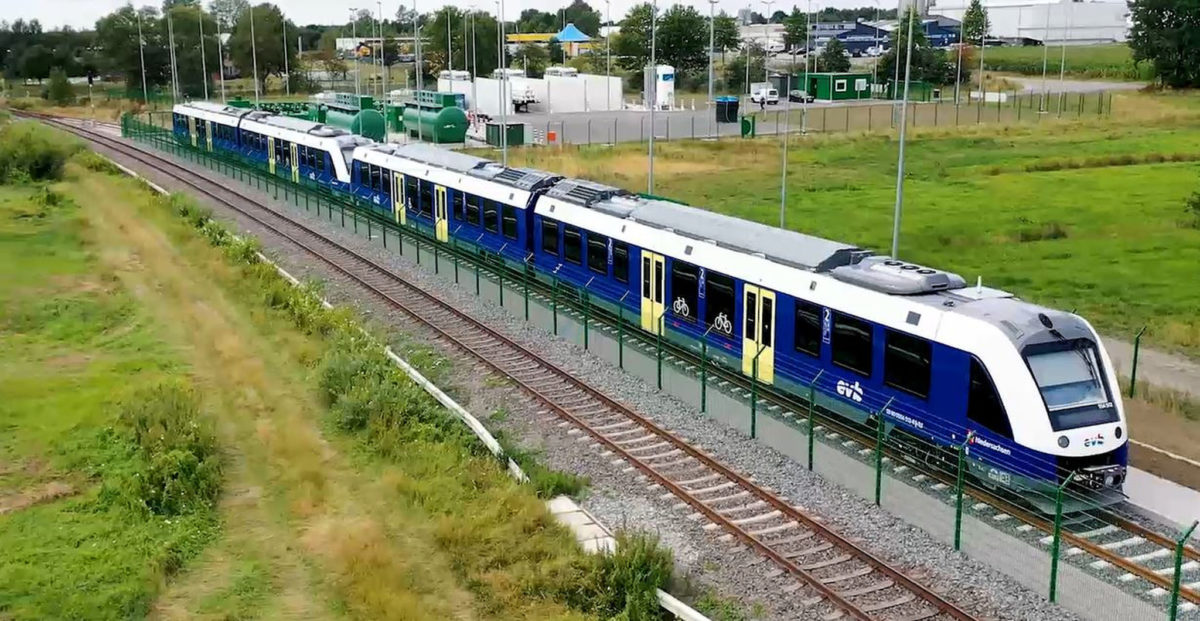From pv magazine Global | via the Hydrogen Stream
Landesnahverkehrsgesellschaft Niedersachsen (LNVG) has started operating 14 hydrogen-powered trains, as part of its plans to gradually replace diesel locomotives on a 100 km stretch of track (60 km) in northwestern Germany. Alstom’s Coradia iLint trains are “now used on the world-premiere, 100% hydrogen train route, in passenger operation,” said the French industrial group. The train can run all day on one hydrogen tank, before being fuelled overnight at the Linde hydrogen filling station. The trains are outfitted with Cummins fuel cell systems. “Cummins will provide an additional 54 fuel cell systems to Alstom for an order of 27 Coradia iLint trains that will be delivered to the Frankfurt metropolitan area,” said the US company. They carried out trial runs for almost two years, in addition to Coradia iLint tests in Austria, the Netherlands, Poland, and Sweden.
University of Connecticut researchers have developed a novel design for a tubular polymer electrolyte membrane (PEM) fuel cell with a replaceable inner electrode and electrolyte. The patent-pending concept design could have nearly twice the energy density of other tubular PEM fuel cells. Planar fuel cells use sandwich-like stacks of rectangular flow field plates made of graphite or metal, which account for about 80% of their weight and 40% of their cost. UConn’s design uses a single tube-shaped flow field that reduces its weight by half and requires fewer precious metals. The team said the novel design also addresses compression issues, uneven current distribution, problems with reactant gas transport, excess water removal, and fabrication challenges associated with the design of planar fuel cells. The concept is still in discovery and has I-Corps and Partnership for Innovation (PFI) funding from the National Science Foundation (NSF).
ABB and Hydrogen Optimised (HOI) have signed a new hydrogen-focused agreement. The deal includes an investment by ABB in Key DH Technologies, the parent company of HOI, to accelerate green hydrogen production. “The companies will leverage their respective capabilities and resources to rapidly commercialise HOI’s patented RuggedCell high-power water electrolysis technology,” wrote the Canadian company. HOI expects its high-power alkaline technology to be deployed in large-scale hydrogen plants in combination with ABB’s high-power rectifiers. The companies said they expect installations from hundreds of megawatts in size to multiple gigawatts. “Other technologies available now operate at low current, which limits the size of each installation – usually at or below 20 MW, and in many cases considerably less. It is the RuggedCell electrolyser’s high-power architecture that makes it possible to have single, large-scale installation of 100 MW and ultimately at gigawatt scale,” Hydrogen Optimized told pv magazine. The RuggedCell is iridium/platinum-free.
SPP-D said that its H2Pilot project in Blatná na Ostrove, Slovakia, shows that hydrogen can be safely distributed in existing gas grids. “From a technical point of view, the mixing device works reliably, dosing continuously and in the required volumes,” SPP-D’s press officer, Milan Vanga, told pv magazine. Chromatographic measurements performed on a weekly basis reportedly demonstrate the homogeneity of the distributed mixture, approximately 10% in all parts of the municipal network. “Inspection of the most risky appliances – 32 oldest and/or atmospheric boilers and 25 stoves – after a month of use with a 10% mixture showed positive results in all cases,” Vanga said, in reference to ignition, flame stability, and functionality. The gas distributor said that customers have not reported any relevant issues. SPP-D launched the project on June 15.
First Hydrogen has announced that its two hydrogen demonstrator vans have completed initial commissioning trials. This “step enables the vehicles to be tested in mixed road and driving conditions and to confirm performance ahead of First Hydrogen’s real-world operational trials with major fleet operators in early 2023,” said First Hydrogen.
Plug Power has signed a supply deal with Amazon to provide liquid green hydrogen starting in 2025. “Amazon and Plug have signed a deal for Plug to supply 10,950 tonnes per year of liquid green hydrogen to fuel Amazon operations,” wrote Plug Power. “Using Plug’s electrolysers, liquefaction capabilities and cryogenic tankers, Plug will deliver hydrogen to Amazon beginning Jan. 1, 2025.”
Namibian Prime Minister Saara Kuugongelwa-Amadhila said last week that green hydrogen is set to become a core pillar in the country’s economic and developmental agenda. The government selected several green hydrogen pilot projects during a recent two-day conference. Four of them will receive NAD 500 million (AU$4.3 million) of German-backed funding.
Germany has approved the co-financing of €223 million (AU$322m) for eight hydrogen projects around its biggest port, Hamburg. The German government has selected a total of 62 major industrial projects in Germany for federal and state funding.
Foton Mobility and Transit Systems have announced the arrival of the first two hydrogen fuel cell buses in Australia. Foton has manufactured and delivered more than 1,100 units, including 450 hydrogen buses used during the Beijing Winter Olympics in 2022. SinoHytec and Toyota jointly developed the fuel cell systems for the buses.
This content is protected by copyright and may not be reused. If you want to cooperate with us and would like to reuse some of our content, please contact: editors@pv-magazine.com.








By submitting this form you agree to pv magazine using your data for the purposes of publishing your comment.
Your personal data will only be disclosed or otherwise transmitted to third parties for the purposes of spam filtering or if this is necessary for technical maintenance of the website. Any other transfer to third parties will not take place unless this is justified on the basis of applicable data protection regulations or if pv magazine is legally obliged to do so.
You may revoke this consent at any time with effect for the future, in which case your personal data will be deleted immediately. Otherwise, your data will be deleted if pv magazine has processed your request or the purpose of data storage is fulfilled.
Further information on data privacy can be found in our Data Protection Policy.